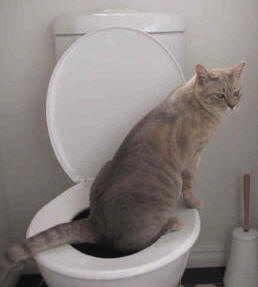An Relevance of Proper Disposal of Animal Waste
An Relevance of Proper Disposal of Animal Waste
Blog Article
We have discovered this post pertaining to 10 Things You Should Never Flush Down The Toilet listed below on the web and reckoned it made good sense to quickly share it with you in this article.

When it involves taking care of waste, especially animal waste, lots of people often turn to the hassle-free alternative of flushing it down the toilet. Nevertheless, this apparently very easy solution can have severe effects for the setting and public health. In this article, we'll explore why flushing animal waste down the bathroom is a bad concept and provide different techniques for proper disposal.
Intro
Appropriate garbage disposal is vital for maintaining ecological sustainability and public health. While it may appear harmless to flush animal waste down the commode, it can result in various problems, both for the environment and human wellness.
Threats of flushing animal waste
Environmental influence
Flushing animal waste introduces harmful bacteria and virus into waterways, which can negatively affect water ecological communities. These pathogens can infect water resources and damage aquatic life, interrupting delicate environments.
Public health worries
Animal waste includes hazardous microorganisms such as E. coli and Salmonella, which can pose severe health dangers to people. Purging pet waste down the commode can contaminate water materials, causing the spread of illness and infections.
Alternatives to flushing
As opposed to purging pet waste down the toilet, there are several alternative disposal methods that are much more environmentally friendly and hygienic.
Composting
Composting pet waste is an eco-friendly way to dispose of it. By composting, organic matter is broken down into nutrient-rich dirt, which can be made use of to fertilize gardens and plants.
Land fill disposal
Disposing of animal waste in a garbage dump is another choice. While not as environmentally friendly as composting, it is a more secure option to flushing, as it protects against the contamination of water sources.
Pet dog waste disposal systems
There are specific pet waste disposal systems offered that securely and hygienically deal with pet waste. These systems often utilize enzymes to break down waste and get rid of smells.
Actions to correct animal waste disposal
To guarantee appropriate disposal of pet waste, comply with these actions:
Scooping and bagging waste
Frequently scoop and bag animal waste utilizing naturally degradable bags. This stops waste from infecting the atmosphere.
Utilizing assigned waste bins
Dispose of bagged animal waste in designated waste bins, such as compost bins or land fill bins. Avoid flushing it down the bathroom in any way prices.
Cleaning can and family pet locations regularly
Consistently clean litter boxes and animal areas to stop the build-up of waste and germs. Use pet-safe cleansing products to keep hygiene.
Advantages of proper disposal approaches
Adopting correct disposal methods for pet waste offers a number of advantages:
Decreased environmental pollution
Correct disposal methods reduce the danger of environmental pollution, protecting waterways and ecological communities from contamination
Minimized danger of water contamination.
By preventing flushing pet waste down the commode, the risk of water contamination is substantially lowered, guarding public health.
Enhanced cleanliness and hygiene
Proper disposal methods promote better hygiene and health, developing a much here safer atmosphere for both humans and animals.
Conclusion
In conclusion, purging pet waste down the bathroom is damaging to the environment and public health. By taking on alternate disposal techniques and following appropriate waste management methods, we can minimize the adverse effect of animal waste and add to a cleaner, much healthier planet.
What To Do With Dog Poo – The Do's And Don'ts Of Disposing Of Faeces
Dog poo bins
Some councils provide dedicated dog waste bins in popular dog-walking areas that can take dog poo that has been bagged but you can legally dispose of dog waste in any public litter bin, as long as it is securely bagged. This also applies to your wheelie bin at home.
Do not flush
Water companies do not recommend flushing dog faeces down the toilet because certain parasites can survive the water processing treatment and are potentially harmful to humans. You should also never consider flushing dog poo that has been bagged down the toilet as the bags will not break down and instead create severe blockages in the sewage system.
In the woods
The Forestry Commission promotes a ‘stick and flick’ method for dealing with waste in the woods. This means finding a stick and using it to flick any poo from off the path so that it is out of the way of other walkers. You could also bury it as long as it is not in an area where there might be livestock.
Livestock
Parasites found in dog poo can be transmitted to livestock if they inadvertently eat infected faeces that has been left on grazing land. This could result in the death of sheep or abortion in cattle so you should always make sure you pick up your dog’s waste in fields where livestock could be present.

Consistently clean litter boxes and animal areas to stop the build-up of waste and germs. Use pet-safe cleansing products to keep hygiene.
Advantages of proper disposal approaches
Adopting correct disposal methods for pet waste offers a number of advantages:
Decreased environmental pollution
Correct disposal methods reduce the danger of environmental pollution, protecting waterways and ecological communities from contamination
Minimized danger of water contamination.
By preventing flushing pet waste down the commode, the risk of water contamination is substantially lowered, guarding public health.
Enhanced cleanliness and hygiene
Proper disposal methods promote better hygiene and health, developing a much here safer atmosphere for both humans and animals.
Conclusion
In conclusion, purging pet waste down the bathroom is damaging to the environment and public health. By taking on alternate disposal techniques and following appropriate waste management methods, we can minimize the adverse effect of animal waste and add to a cleaner, much healthier planet.
What To Do With Dog Poo – The Do's And Don'ts Of Disposing Of Faeces
Dog poo bins
Some councils provide dedicated dog waste bins in popular dog-walking areas that can take dog poo that has been bagged but you can legally dispose of dog waste in any public litter bin, as long as it is securely bagged. This also applies to your wheelie bin at home.
Do not flush
Water companies do not recommend flushing dog faeces down the toilet because certain parasites can survive the water processing treatment and are potentially harmful to humans. You should also never consider flushing dog poo that has been bagged down the toilet as the bags will not break down and instead create severe blockages in the sewage system.
In the woods
The Forestry Commission promotes a ‘stick and flick’ method for dealing with waste in the woods. This means finding a stick and using it to flick any poo from off the path so that it is out of the way of other walkers. You could also bury it as long as it is not in an area where there might be livestock.
Livestock
Parasites found in dog poo can be transmitted to livestock if they inadvertently eat infected faeces that has been left on grazing land. This could result in the death of sheep or abortion in cattle so you should always make sure you pick up your dog’s waste in fields where livestock could be present.

I hope you enjoyed reading our excerpt about 10 Things You Should Never Flush Down The Toilet. Many thanks for taking a few minutes to browse our piece. Sharing is caring. Helping others is fun. Thanks so much for going through it.
Call Report this page